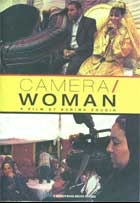
Camera/Woman. A film by Karima Zoubir 2012
Distributed by Women Make Movies, 115 W. 29th Street, Suite 1200,New York, NY, 10001; 212-925-0606
Produced by Karima Zoubir
Directed by Karima Zoubir
DVD, color, 59 min.
General Adult
Women’s Rights, Morocco
Date Entered: 05/21/2014
Reviewed by Sandra Collins, Byzantine Catholic Seminary Library, Pittsburgh, PAThis slice-of-life film follows Khadija, primarily a wedding videographer, as she struggles against the cultural prejudices that follow a divorced, working woman in Moroccan culture. She works for a male videographer who is happy to have her film the female-only events since this means that the women will be more agreeable to being filmed. However, when the videotapes are produced, it seems that only his name appears, not hers, despite her considerable time investment and labors. And, while she is the primary breadwinner for her family, she is also a single woman with a son living back with her birth family, a situation that suits none of them. Even her employer is feeling the heat; his wife is jealous of their conversations so she must curtail interacting with him in public. As one friend notes, to be a divorced woman is analogous to prostitute in Moroccan culture. After suffering the blistering disapproval of her mother and brother, who happily take her money but dismiss the labors that provide this largesse, she temporarily places her son back in her husband’s family and sets off to find affordable housing for them both. Though she promises to retrieve the distraught son from his father’s house in 24 hours, the film ends with Khadija still living with two divorced female friends, without permanent housing for herself and her son.
The film itself accurately portrays the quotidian details of poverty and struggle in Morocco. As a woman whose work almost requires her to work evenings, she is freed from the constraints of a husband but still limited by the severe judgments of her family. The glittering, over the top spectacle of the weddings she films serves as something of a backdrop as well as a warning. A divorced female friend remarks on the irony that for many women in Islamic Moroccan culture, the wedding is the climax, but they both cynically recognize that the wedding was the beginning of their troubles.
At times short on dialogue in order to convey the emotional anguish of Khadija, this film requires some familiarity with Islamic cultural norms in order to make sense of the negative family backlash. And, while it lacks a significant narrative arc, it still succeeds in providing a glimpse into what life for women in a non-Western culture really looks like. Recommended for gender studies and global culture classes where it is sure to prompt rich discussion.